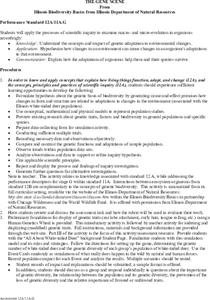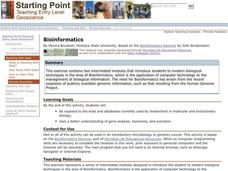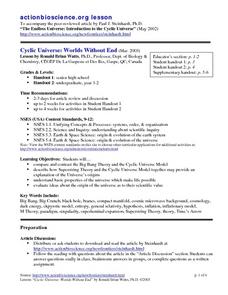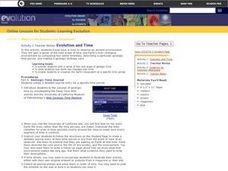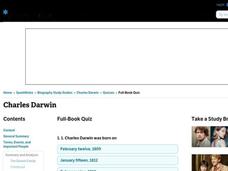Curated OER
Blocks And Screws (or "screwy Contrivances")
Young scholars, given a block of wood and a screw or nail, are asked to put that screw or nail into a block. They examine how many contrivances and other imperfections found in living things are best explained by the process of evolution.
Curated OER
Word Adaptation
Seventh graders differentiate evolution and adaptation. In this biology lesson, 7th graders make new words from a given word by adding or changing a letter. They set up a T-chart and enumerate how adaptation is like or unlike evolution.
Curated OER
The Gene Scene
High schoolers investigate the concepts of micro and macro evolution. They also research the effects of mutations in the process of genetic adaptation to different environments. They develop a hypothesis of how the environment can...
Curated OER
Bioinformatics
Students are exposed to the tools and databases currently used by researchers in molecular and evolutionary biology. They gain a better understanding of gene analysis, taxonomy, and evolution.
Curated OER
Natural Selection and the Peppered Moth
Learners study natural selection and its process in the peppered moth. In this evolution lesson, students read about the concept of natural selection as suggested by Charles Darwin. Learners then complete a natural selection simulation...
Curated OER
Hertzsprung-Russell Diagram
Learners examine the relationship between temperature and brightness. In this astronomy lesson students will correlate the evolution of stars to the HR diagram plotted.
Curated OER
Who Was Charles Darwin?
Students research the life of Charles Darwin and his voyage on the Beagle.
Curated OER
Cyclic Universe: Worlds Without End
Students compare and contrast the Big Bang Theory and the Cyclic Universe Model. They explain basic properties of the univers which make life possible. They evaluate ideas about the origin of the universe as to their scientific value.
Curated OER
Learning Cycle Lesson Plan #6 (Misconception)
Ninth graders investigate evolution via natural selection and form an opinion. They support their opinion using scientific evidence and apply this to adaptations that have allowed certain organisms to survive.
Curated OER
Happy Birthday, Earth!
Students visualize the Earth's ecosystem at a specific time period and how Earth has changed over time. They create a detailed journal entry for a specific time period and create a birthday card to Earth.
Curated OER
Wild Kingdom
Students research and discuss the natural habitats and various evolutionary theories of giraffes and other animals imported into ancient Rome.
Curated OER
Deep Time
Students compare geologic time periods to the calendar year. They set up a live-action student timeline in the classroom.
Curated OER
Evolutionary Arms Race
Students recognize that a connection exists between an organism's physical and behavioral traits and its environment. They explore and define different types of interactions that can occur between organisms.
Curated OER
Compare Human-made Objects with Natural Objects
Students examine and observe how many human-made objects get their basic design from things in nature. They listen to the book "Nature Got There First," compare/contrast hollow bones with drinking straws, bird beaks and tool pliers, and...
Curated OER
Habitats and Adaptations
Students research and describe the habitat and adaptations of a reef animal. After the student is assigned a habitat, they design and draw a cresture adapted to eat each food and to live in each habitat.
Curated OER
Team Works
Students define "group" and list American social and political movements throughout history. They examine one model of a successful team and positive group mentality by reading and identify the traits of a successful group and those of...
Curated OER
The Hardy-Weinberg Equilibrium
Students act out a drama in this lesson on one aspect of the Hardy-Weinberg Equilibrium. They are to follow all stage directions precisely and give it their best effort to get across the main points of the play.
Curated OER
Big Cats
Students study what a niche is and its role in a community. In this cats instructional activity students research the Internet for information on big cat species.
Curated OER
Charles Darwin
In this online interactive history quiz worksheet, students respond to 45 multiple choice questions about the accomplishments of Charles Darwin. Students may submit their answers to be scored.
Curated OER
Kids for Conservation: Animal Unit
Students discuss animal needs and characteristics. In this animal mini-unit, students complete three activities studying different animals, their needs, how they have evolved, and how to protect them.
Curated OER
Classification and Binomial Nomenclature
Students practice identifying different groups of living organisms using a dichotomous key. Students also examine the history of an organism and its lineage by writing a paragraph about it and "three generations" of ancestors.
Curated OER
Evolution of Observation
Pupils develop an awareness of the evolution of the scientific method. They facilitate the student's knowledge of looking at variables from different perspectives. Students develop their abilities to defend their ideas with facts or...
Curated OER
Hide and Survive: A Natural Selection Activity
Students explore the theory of natural selection given certain scenarios. In this biology lesson, students graph data taken from the experiment. They explain the factors that contribute to the survival of the fittest.
Curated OER
The Right Tool for the Job: Fishing Tools and Technology
Students use modern technology to research the history, design, and function of a specific tool or piece of fishing technology. They create a timeline and story about the evolution of the tool.
Other popular searches
- Theory of Evolution
- Darwin's Theory of Evolution
- Darwin Theory of Evolution
- Darwins Theory of Evolution
- The Theory of Evolution




